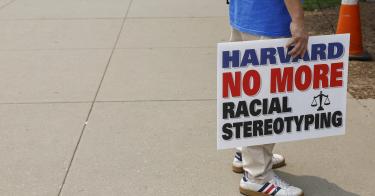Late last month, in a 6–3 decision, the Supreme Court overturned racial preferences for college admissions, making it clear that racial discrimination will no longer be tolerated in American higher education. The Right understandably celebrated this decisive and long-overdue victory in the courts, but on campuses across the country, the question of what comes next looms large.
The Left will not accept this decision from a court majority they have smeared as “illegitimate” (especially Justice Thomas). Progressives will instead continue their shameless efforts to pursue racial preferences by any other means possible. As President Biden put it: Democrats ”cannot let this decision be the last word.” Conservatives must confront these efforts at every turn, whether that means publicly defending the integrity of the Supreme Court or suing elite universities who violate their ruling.
But playing defense is not enough. Considering the American people support race-blind college admissions by wide margins, the Right has an obligation to build on the momentum from this decision and advance a positive agenda for America’s colleges and universities.
We should aspire to rid America’s colleges and universities not only of racial preferences, but also of the Marxist ideology that underlies them. To do so requires two things that many right-of-center politicians have lacked for decades: political courage and a substantive vision of the good. Without a substantive vision of the good, political courage is pointless (if not outright self-defeating), and without political courage, a substantive vision of the good is toothless. But let’s examine them one by one.
First, to defeat the entrenched “Diversity, Equity, and Inclusion” (DEI) bureaucracy, conservatives must stop waiting for the truth to win out in the “free marketplace of ideas”—a market the Left hijacked decades ago. They must instead make a compelling case for capital T Truth. Whether that means establishing bold new ventures in the private sector or pulling the levers of state power to reform public universities, it is time to go on offense.
A new vanguard of conservatives is already leading on this front. At the grassroots level, parents around the country are fighting to take back their school boards. Others are banding together to found K-12 classical schools or home school co-ops. In a few short years, some of their children will be heading to college where the terrain is hostile to conservative values.
Thankfully, governors around the county are beginning to help change this terrain. For example, this summer, Texas governorGreg Abbott banned diversity, equity, and inclusion (DEI) offices at public colleges and universities across the state. Florida governorRon DeSantis has made similar moves and recently announced that colleges’ core curriculums “must be grounded in the actual history, actual philosophy that has shaped western civilization.”
Clearly, these conservatives—unlike so many of the establishment Republicans that misappropriate the banner of freedom today—remember William F. Buckley, Jr.’s determination inGod and Man at Yale to distance himself from “the school of thought, largely staffed by conservatives, that believes teachers ought to be ‘at all times neutral.’“ In fact, Buckley insisted,
“Where values are concerned, effective teaching is difficult and stilted, if not impossible, in the context of neutrality; and further, I believe such a policy to be a lazy denial of educational responsibility.”
If conservatives are to win the uphill battle of taking back America’s colleges and universities—and with them, the commanding heights of culture—we must do more than dismantle DEI. We must replace DEI’s corrupt moral vision with a proper understanding of the good. That’s the difference between merely defending “free speech”—which is practically all that conservatives have attempted to conserve on campus for the past 50 years—and giving students a sense of what they should use their speech for: the advancement of the good, the true, and the beautiful.
Thankfully, the Right doesn’t have to reinvent the wheel. It simply has to reclaim its own heritage.
It won’t be easy, but with red-state governors taking an interest in university governance for the first time in decades, the few remaining professors on campus that haven’t succumbed to social Marxism will finally have the support they need to boldly introduce a new generation of students to the Western tradition and its conception of the good life. In time, America’s colleges and universities might even host professors that edify, rather than corrupt their students.
As President of Wyoming Catholic College, I witnessed first-hand how such an education can transform a community, and I am confident that applying the same principles at other colleges and universities could transform our country. By avoiding value-neutral education and embracing our tradition, we taught students not only to defend freedom, but to love it and use it well in their lives. In turn, we produced not only skilled employees, but upright citizens, good husbands and wives, proud fathers and mothers, and faithful churchgoers.
The riches of the West, particularly its Christian inheritance, should not be relegated to religious schools, or to a few small private schools that refuse to take federal student loans and grants. And conservatives need not only advocate for “academic freedom” or “viewpoint diversity.”
No, after the de jure if not de facto end of racial preferences, the next step is an unapologetic teaching of the history and values of the West: from Homer to Aquinas and Shakespeare to T.S. Eliot. Anything less is not only doomed to fail—value-neutral education is what led us to our current predicament in the first place—but would be an abdication of our moral responsibility as leaders, educators, and parents to pass the torch of the West onto our progeny.
This piece originally appeared in Newsweek




